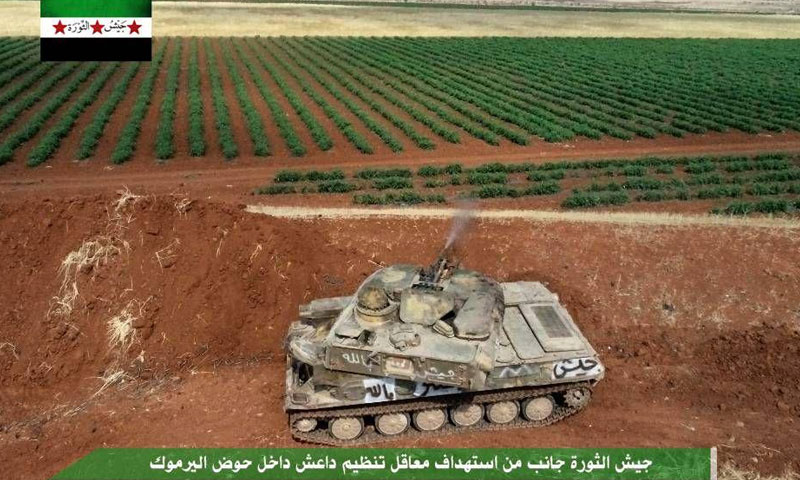The Yarmouk Basin, in the western countryside of Daraa, is yet witnessing battles between the opposition factions and the “Khalid ibn al-Walid Army.” It is not their non-stop state that makes the battles distinct, but rather the fact that they have turned into a vicious circle of attacks conducted by the latter and a few hours long battles launched by the factions, while none of the involved parties is able to change a thing in this war’s equation.
Within the same equation of hostilities, the civilians exist only as the party to pay the price; they pay with their souls; they pay with displacement, siege and poverty that afflict their lives.
In the geographical space between the two conflicting parties’ control positions, thousands of dunams of agricultural plains are spread, known since dozens of years for their quality soil and abundance with water, the thing which turned them into an agricultural reservoir for Southern Syria.
For the past three years, facing the lacking wheat and the constant absence of flour, the farmers chose to focus on cultivating wheat alone, seeking to provide the area with the needed amount regardless of the military distribution in the area, because the dire need for bread has attacked the areas under the control of the two conflicting parties.
A State of Total “Alert” Is Demanded to “Make a Living”
The ongoing military confrontations have pushed farmers during the wheat harvest season to a state of alert. Wheat and similar agricultural crops are flammable, and fire can spread over wide geographical areas within a few minutes.
Under the Yarmouk Basin’s war circumstances, farmers are all the time afraid of fire, for any stray bullet or random mortar shell might set the fields ablaze. The break out of the hostilities makes preventing or stopping fire a pretty much risky mission.
This fear has, in the past a few weeks, turned into the farmers living reality in all of Daraa’s western countryside, for the fire of the almost daily confrontations between the opposition fighters and “Khalid Army” has burned hundreds of wheat planted dunams.
Abu Mujahid al-Eid, from the town of al-Shajara under the control of “Khalid Army,” lost more than ten dunams. He told Enab Baladi that “even before the season’s beginning, we have considered the risk of cultivating wheat because of the fire. But there is an urgent need for it. The reason why I planted half of the land with wheat and the other half with watermelons.”
The farmer described the first seconds of the fires outbreak as the town witnessed an exchanged shelling. This set a part of the harvest on fire, which extended to the rest of the crops in seconds.
Even though the area has regained its repose, the farmer and dozens of his neighbors chose to risk themselves to contain the fire so it would not extend to wider areas of land. He explained the mission’s difficulty, saying “we were forced to use rudimentary methods. Each of the farmers started blowing his land and divided it into separate parts to prevent the fire from extending, until the water tanks came to help us put the fire down.”
“Abu Mujahid’s” financial loss accumulated to more than 700 thousand Syrian pounds (the equivalent to nearly 1800 dollars), considering that losing the opportunity to provide a wheat and flour reservoir was more bitter than his monetary loss.
An Early Harvest on the Other Side
The story is identical on the other side, for the battles have led to a fire breakout in a wide space at the outskirts of the city of Nawa and the town of al-Shaykh Saad, which the opposition factions control.
Thee factions accused “Khalid Army” of deliberately setting the wheat crop on fire to impose pressure on the people and to distract the opposition factions as not to launch any military operation against the Army.
The accusations did not change any of the reality’s details; actually, they compelled dozens of farmers to harvest the crops earlier than usual as one of the combine’s owners has told Enab Baladi.
He pointed out that early harvesting will decrease the crops’ amount slightly since that mid-July is considered the ideal time to start harvesting wheat. However, this is less dangerous than losing all the crop in a few seconds.
The combine’s owner explained that their mission also involves danger because the exchanged shelling, the confrontations and their suddenness threaten their work and their lives.
These happenings are not new to the area, for the Assad’s forces have resorted to targeting crops in the areas out of their control, deliberately setting them on fire to weaken the areas’ economic power, due to which farmers stopped planting “flammable” crops and replaced them with other types.
However, the deliberate or non-deliberate exchanged fires move to the depths of the areas out of the Assad’s forces control, which are originally suffering wheat and flour shortage predicts an ominous future for bread in rural Daraa.

